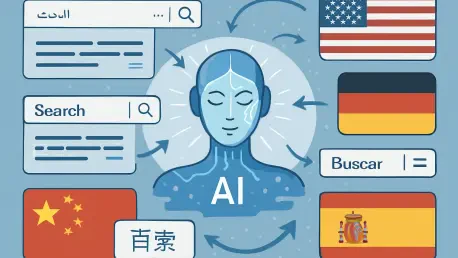In an era where digital connectivity shapes daily life, imagine a world where language barriers no longer hinder access to information, and a single search query can deliver tailored, culturally relevant results to users in remote corners of the globe. Google has taken a monumental step toward this vision by expanding its AI Mode feature in Search to over 180 countries, incorporating multilingual support that transcends its original English-only framework. This bold move is not just a technical upgrade but a transformative effort to democratize information access for diverse linguistic communities. By leveraging cutting-edge artificial intelligence, Google aims to reshape how billions interact with the internet, prioritizing inclusivity and relevance. This expansion signals a pivotal shift in the tech landscape, raising questions about global connectivity, competition, and the ethical implications of AI-driven search tools.
Expanding Horizons with Multilingual AI
Breaking Language Barriers Worldwide
Google’s ambitious rollout of AI Mode to over 180 countries marks a significant milestone in addressing linguistic diversity in digital spaces. This initiative moves beyond English, embracing languages such as Spanish, French, German, and numerous Asian dialects to ensure users receive search results in their native tongues. The focus is on enhancing engagement by delivering AI-generated responses that resonate culturally and contextually with local populations. Underpinning this expansion are advanced natural language processing techniques and the latest Gemini models, which enable precise translations and context-aware answers. For many users in emerging markets, where a vast number of internet users reside, this development opens up unprecedented access to information that was previously out of reach due to language constraints. The potential to connect with global knowledge bases in a familiar language is a game-changer, fostering a more inclusive digital ecosystem that prioritizes accessibility over uniformity.
This expansion also highlights Google’s strategic intent to solidify its position in the competitive AI search arena. By catering to non-English speakers, particularly in regions with rapidly growing internet penetration, the company is not only broadening its user base but also setting a new standard for search innovation. Early feedback from regions like Latin America and Europe suggests a noticeable improvement in search relevance, as AI Mode synthesizes information from multiple sources for a more holistic user experience. However, challenges remain in perfecting idiomatic expressions and regional dialects to avoid miscommunication or misinformation. Ensuring accuracy across diverse linguistic landscapes is no small feat, and Google’s ability to refine these aspects will be crucial in maintaining user trust. This balance between technological advancement and cultural nuance underscores the complexity of scaling AI on a global level, where every language presents unique hurdles.
Enhancing Functionality with Agentic Features
Beyond linguistic inclusivity, Google’s AI Mode introduces agentic features that add significant value to the search experience, especially in multilingual contexts. These capabilities allow users to perform actions like booking reservations or accessing localized assistance directly from search results, streamlining interactions in ways previously unimaginable. For instance, a user in a non-English-speaking country can now search for travel options and complete bookings without navigating language barriers or multiple platforms. This functionality is particularly impactful in regions where localized digital services are limited, offering a seamless bridge to essential resources. The integration of such features demonstrates a forward-thinking approach to user needs, prioritizing practicality alongside accessibility in a world where digital convenience is increasingly expected.
Moreover, these agentic tools are poised to redefine how users engage with search engines, shifting the paradigm from passive information retrieval to active problem-solving. The implications extend to industries like hospitality and retail, where direct interactions facilitated by AI can enhance customer experiences across linguistic divides. However, this innovation also raises concerns about data privacy, as the collection of user information for personalized services comes under scrutiny, particularly in regions with stringent regulations like the European Union. Balancing functionality with ethical considerations remains a critical challenge, as regulators and users alike demand transparency in how data is handled. Google’s ability to navigate these concerns while expanding its feature set will likely influence public perception and adoption rates. This duality of opportunity and responsibility shapes the broader narrative of AI’s role in transforming global search dynamics.
Implications and Future Prospects
Impact on Businesses and Digital Ecosystems
Google’s multilingual AI expansion presents a double-edged sword for businesses reliant on organic search traffic. With AI Mode providing direct answers within search results, there’s a potential reduction in clicks to external websites, prompting companies to rethink their digital strategies. Guidance from Google Search Central emphasizes the importance of structuring content to align with AI features, focusing on high-quality, authoritative information to remain relevant. This shift could profoundly affect sectors like education and e-commerce, where language barriers have historically limited reach. By adapting to these changes, businesses can tap into new markets, leveraging AI-driven search to connect with diverse audiences. The opportunity to break through linguistic constraints offers a pathway to growth, but it requires agility and foresight to navigate the evolving landscape effectively.
For developers and content creators, this transition introduces both challenges and avenues for innovation. Adapting to AI Mode’s algorithms means prioritizing content that answers user queries directly, which can be a steep learning curve for those accustomed to traditional SEO practices. Sectors that embrace this change stand to gain significantly, as the removal of language barriers can accelerate global reach and user engagement. Conversely, the risk of reduced visibility looms large for those slow to adapt, potentially altering competitive dynamics within digital markets. Additionally, the ethical dimension of AI-generated content, such as ensuring unbiased responses, adds another layer of complexity for businesses aiming to maintain credibility. Monitoring user feedback and adoption trends will be essential to gauge the long-term impact on traffic patterns and to refine strategies that align with this AI-driven search era.
Vision for a Connected Digital Future
Looking ahead, Google’s roadmap includes integrating AI Mode with services like Maps and Shopping, promising a more cohesive and personalized user experience across platforms. Industry insights suggest that agentic capabilities will serve as key differentiators in multilingual markets, where tailored solutions can address unique regional needs. This vision of blending personalization with linguistic diversity points to a maturation of AI in search, redefining how information is accessed globally. Analysts anticipate that non-English usage of AI Mode could soon match its English counterpart, fundamentally shifting digital interactions. Such a trend underscores the transformative potential of AI to bridge divides, creating a more interconnected online environment where language is no longer a barrier to knowledge or services.
Reflecting on the broader implications, this expansion also invites scrutiny over privacy and ethical AI use, as global regulators continue to monitor data handling practices. The challenge lies in balancing innovation with accountability, ensuring that technological advancements do not come at the cost of user trust. Google’s commitment to inclusivity through multilingual support sets a benchmark for competitors, pushing the industry toward more equitable solutions. As adoption rates grow, the focus will shift to refining user experiences and addressing cultural nuances to prevent missteps. This ongoing evolution highlights the need for continuous dialogue between tech giants, users, and policymakers to shape a digital future that prioritizes both accessibility and responsibility. The journey toward a truly connected world through AI-driven search is just beginning, with much to learn and adapt along the way.
Reflecting on a Transformative Milestone
Google’s rollout of AI Mode across over 180 countries with multilingual support stands as a defining moment in the evolution of search technology. It tackles linguistic diversity head-on, elevates user engagement, and establishes new benchmarks for competitors, even as it grapples with technical hurdles and regulatory oversight. This strategic endeavor underscores a dedication to reshaping global information access, carefully balancing innovation with ethical imperatives in a digitally interconnected landscape. The multifaceted impact on users, businesses, and markets reveals the profound potential of AI to dismantle language barriers and promote inclusivity. Moving forward, stakeholders are encouraged to monitor adoption trends closely, advocate for transparent data practices, and invest in content strategies that align with AI capabilities. This pivotal step by Google not only redefines search but also paves the way for a future where digital equity could become a tangible reality, inspiring continued collaboration across the tech ecosystem.









